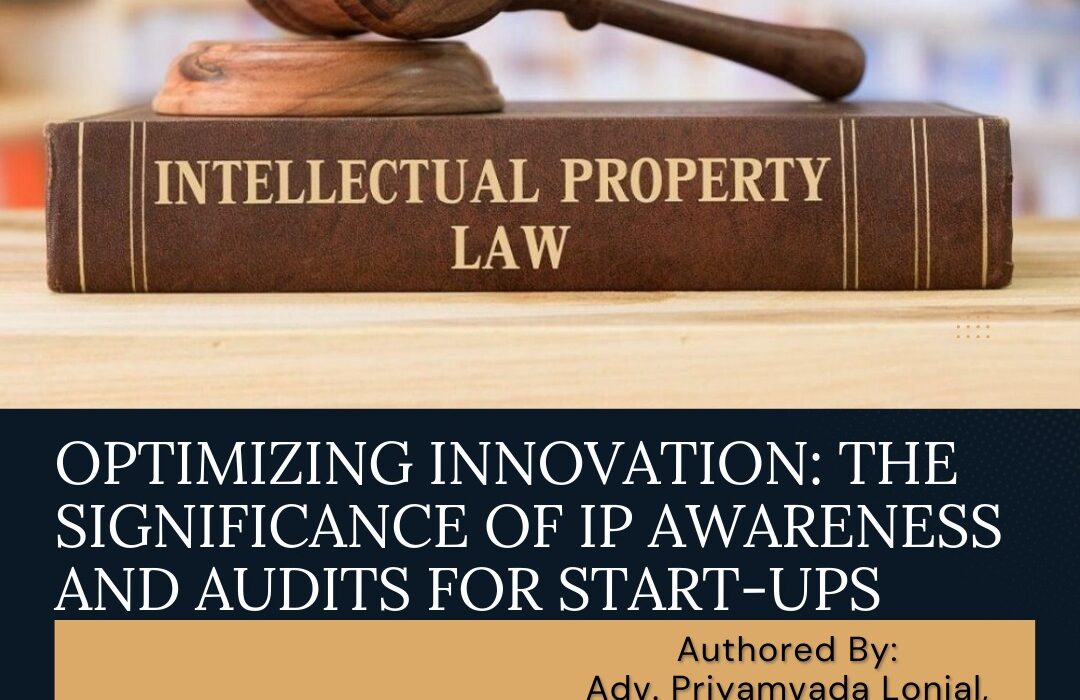OPTIMIZING INNOVATION: THE SIGNIFICANCE OF IP AWARENESS AND AUDITS FOR START-UPS
Start-ups harbour immense potential to enter into and exploit new markets for the larger good; by virtue of their innovative nature, agility, and flexibility. What we are witnessing at present is the rapid growth of start-ups exploring international markets by virtue of their ideas and know-how to enable innovation. However, more often than not, a slew of legal, regulatory, market-entry related and other barriers await, and even deter start-up founders well before they can truly capitalize on their innovation on a global paradigm.
Challenges Faced by Start-Ups: An Overview
Multiple studies and sources suggest that nearly 20% start-ups fail during their first year, 50% fail during the first 3 years, while 90% fail to make it past the five year mark. The key reasons contributing to this failure, include:
- Financial issues like inadequate funding, and mismanagement of capital;
- Lack of market need for the products/ services being offered by the start-up;
- Highly competitive markets and unequal distribution of resources;
- Unsuccessful business models; and most importantly,
- Legal disputes arising out of inadequately protected/ vulnerable IP
In light of the aforementioned hurdles, it becomes extremely crucial to assess a plethora of factors, including but not limited to market conditions, funding landscape, availability of resources (or lack thereof), scope to grow internationally, and the presence of relevant actors to facilitate the said growth. If one may consider the increasing competition on an international level, it becomes apparent that merely being innovative is no longer the way to go ahead.
IP Sensitization: What is it?
Intellectual Property is a powerhouse which is capable of making or marring the prospects of a start-up. Giving entities a competitive edge, it is instrumental in protecting unique ideas, creations, technologies, trade secrets, etc., which are vital to fend off competitors, and eventually sustain in the market. Studies conducted by the European Patent Office and the EUIPO (European Union Intellectual Property Office) suggest that start-ups having at least one registered IP are 10 times more likely to receive funding, have better prospects of growth, and are 10% more likely get converted into high-growth firms.
This brings us to the significance of IP Sensitization: a process which refers to generating awareness about IP, its importance, and how it may be effectively utilised to optimise the operations of an entity. IP sensitization goes a long way in protecting innovation byreducing the risksassociated with legal disputes, and increasing overall IP literacy. In a world where innovation (or lack thereof) and funding decide the fate of a start-up, many founders inadvertently forego of registering the relevant IP, which in turn leads to difficulty in securing investments in the future; and even prevents the start-up from reaping the rewards of its hard-work. It is to be kept in mind that even before incorporation, it is crucial to identify any intellectual property generated, so as to enable the formation of a robust protection mechanism and safeguard the prospects of the start-up.
But how to ascertain the extent of IP generated and/ or consumed by the start-up? That brings us to the next section of this article, i.e. IP Audits.
Intellectual Property Audit: A Game Changer for Start-Ups
Intellectual Property Audits, or simply, IP Audits are termed as systematic reviews of an entity’s intellectual property assets. This process helps in identifying all forms of IP, be it copyrights, trademarks, trade secrets, patents, designs, or utility models, among others; and subsequently facilitates risk assessment and management, remedying deficiencies, and implementing the best practices associated with IP asset management. IP audits can be divided into three broad categories, namely:
- General Purpose IP Audit, which is usually carried out before the incorporation of a new venture to ascertain its intangible assets and devise a protection mechanism accordingly. Alternatively, it may also be carried out in the event that a business is considering to implement new IP-related policies and procedures; or when the company is set to undergo a significant re-organization.
- Event Driven IP Audit, which is also known as IP due diligence; and carried out to objectively assess the value and risk associated with a company’s IP portfolio before seeking investment. It is also undertaken in the event of M&As, wherein an NDA is to be signed between the company, and the investor/ acquirer.
- Limited Purpose Focused Audit, which are mostly situation based and are undertaken to justify the valuation of certain assets, or the legal situation thereof. They may be carried out in the context of personnel turnover, foreign IP filings, changes in IP related laws and policies, litigation, and clean room procedures.
The process begins with the preparation of a detailed checklist by the auditor. Post that, due consideration is given to all possible agreements which may affect that IP portfolio of the entity, including licensing, assignment, employment, independent contractor, joint venture, franchise, collaboration, royalty, and non-disclosure agreements, among others. Once the agreements are audited, the IP assets, including the IP policy (if any) are audited, assessed, analysed, evaluated, and reviewed. This helps in determining ownership of assets, ascertaining whether relevant safeguards are in place to protect the IP of the entity, and planning for the way ahead in terms of dealing with, and/ or remedying any deficiencies or infringement in this regard.
But how and why are IP audits beneficial to a start-up? Let’s take a look:
- Identification of potential risks associated with the IP, including infringement and loopholes in the existing protection mechanism (if any), which enables the start-up to address these issues before they snowball into something more complicated;
- Helping the start-up ascertain the value of their IP portfolio, post which, a strategic IP protection mechanism can be built to leverage upon the assets by virtue of exercises like IP Registration, seeking R&D grants, investments, etc.; and
- Enabling the start-up to capitalize on its IP by virtue of forging strategic partnerships with international players, and entering into licensing, royalty, and other relevant agreements.
In short, IP Audits are crucial for start-ups as they play a pivotal role in growth, building a consumer base, and establishing a brand name in the long run. This in turn enhances the prospects of start-ups receiving funding from investors, VC firms, etc.
Conclusion: Way Forward
Now that the aspects of IP sensitization and audits have been discussed in detail, it is important to acknowledge that asset management is crucial to ensure the relevance of the IP policy, and also to ensure that the IP continues to remain well-protected. The staff should be well trained on the best practices pertaining to IP, and the existing IP policy must be continuously monitored and reviewed to effectively manage the procedures.
In conclusion, sensitization and audits are not merely preventive tools for IP protection when it comes to start-ups, but also strategic measures which may come in handy in unlocking the full extent of the potential of such entities. Investing time and financial resources in these exercises is bound to give robust returns by enhancing the company’s market standing and reputation.
Authored by: Advocate Priyamvada Lonial, SUO Law Offices



